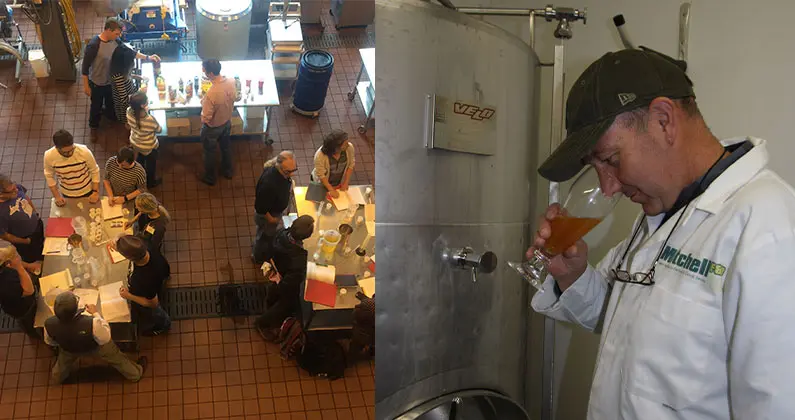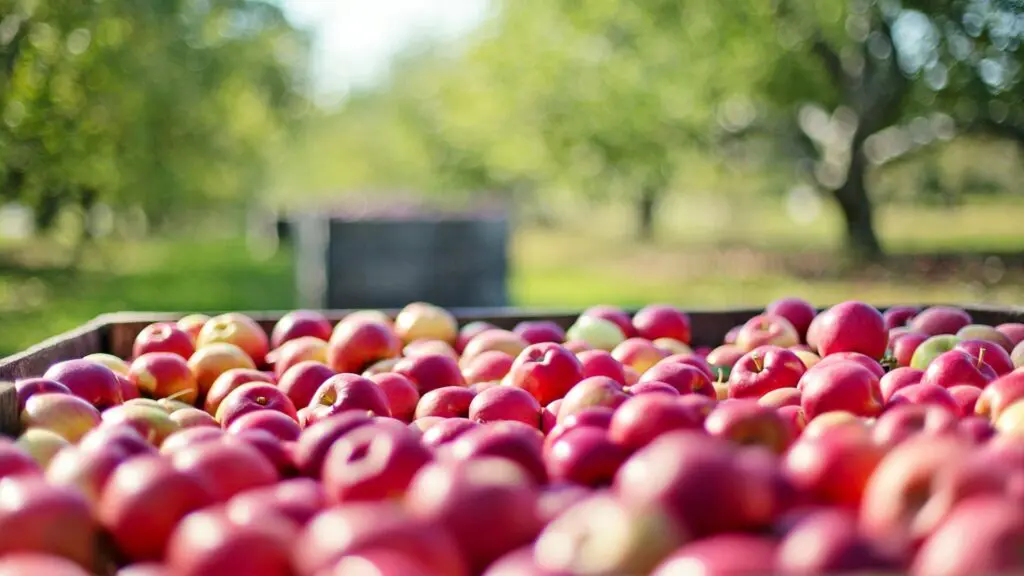Cidermakers across North America reflect on expert Peter Mitchell’s industry impact.
Before there was a cider revival, when those who imbibed the beverage were few, the first formal cidermaking course taught by cider expert Peter Mitchell was offered at Washington State University’s (WSU) Mount Vernon Research and Extension Center.
It was 2003 and Drew Zimmerman, one of the first commercial cidermakers in Washington State, remembers that there were just enough local attendees to cover the lab and equipment costs plus Mitchell’s travel expenses from the United Kingdom. “The class wound up being amazingly successful,” Zimmerman says. From there, he urged Mitchell to continue his teachings for the greater good of North American cider.
Thirteen years later, the difference between that inaugural course and Mitchell’s weeklong “Cider & Perry Production – A Foundation” course held at Cornell University’s New York State Agricultural Experiment Station this past June couldn’t be starker. More than 200 people were on a waitlist for a spot in the 25-seat course, and attendees hailed from all over the United States and Canada. Chris Gerling, an enology extension associate who has assisted with the course since 2008, says the class filled up in 10 minutes and they couldn’t turn off the registration button fast enough.
THE GREATER NEED
When asked about how he became a sought-after cidermaking instructor, Mitchell remarks that the path was a series of happenings that “just fell into place.” As a biology lecturer at Hindlip College in the U.K. during the 1980s, he became interested in cider “and there seemed quite a bit of need for teaching about it,” he says. “Then after I began teaching the course, I realized there was a greater need than I originally thought.”
This greater need was a result of Long Ashton Research Station, a leading U.K. cider research center, shutting down, leaving a void in cidermaking education and research. When the cider industry began to grow significantly in England during the 1990s, Mitchell’s classes swelled with attendees.
That is until 2003, when Hindlip College changed its curriculum offerings and became the Institute for Animal Husbandry, leaving Mitchell without a classroom. “The last class that I ran was attended by Drew Zimmerman, and he said, ‘Why don’t you come over to the States and do some training,’” says Mitchell. “And so I came out.”
That conversation led Mitchell to spend the next decade crossing the Atlantic to teach his traditional English cidermaking course at sites in Washington, Oregon and New York through his business, the Cider and Perry Academy. Today, his course combines lectures on the history of cider imbibing with sensory analysis of cider and perries to the practical laboratory work of blending and measuring a cider’s specific gravity.
“Everyone I know who has opened cideries in the last two years and is doing it correctly and being successful, they all started with Peter’s class,” says Adam Diskin, co-founder of Diskin Cider, which is set to open this winter in Nashville, Tennessee. Diskin attended the Foundation and Building Expertise courses in 2014, and he says that Mitchell’s microbiology and biochemistry background makes the difference in understanding the science involved in making cider.
THE SCIENCE OF CIDER
“The first thing he emphasized was really the proper way to make a good cider,” explains Diskin. “Many people think it’s so easy, you just ferment some apple juice but it’s not really that at all. There’s both a real science and art to the fermentation, which is what Peter explained so well.”
Developing a better understanding of the fermentation process enabled Tim Larsen, cidermaker for Snowdrift Cider Co. in Wenatchee, Washington, to improve his company’s products and hone his skills. Although he and his extended family had been making and testing ciders since 2005, Mitchell and his courses helped to give perspective. “Peter really helped us on what to look for in healthy fermentation and how to manage healthy fermentation for cider,” Larsen says. “This was information that didn’t exist in the U.S. at that time.”
Larsen’s father-in-law attended Mitchell’s course at WSU’s Mount Vernon campus, and Larsen and his wife attended the course at Mitchell’s U.K. base, The Orchard Centre, a commercial production facility where Mitchell makes his own award-winning Out of the Orchard cider and perry products.
“The culmination of all Mitchell’s knowledge, his scientific background and his experience in cidermaking come together in a really great package,” Larsen says of the course. “He delivers that very clearly, which is hard to do.”
For Mitchell, teaching cidermaking from a scientific perspective is necessary to create a good product. “When something goes wrong during the fermentation, you have to think through about what is going on and why it’s not working out,” he explains. “I often get asked by people, ‘Can I have a recipe for making cider?’ and I point out there really is no recipe — you have to understand the science of making cider.”
Although Mitchell says the basic principles taught in the course haven’t changed since he developed the curriculum in the 1980s, he is constantly revising the material. “There are changes in legislation so you have to keep an eye on that side of things, markets change and, in some respects, people’s tastes change,” he notes. “Even when I’m running a class, I’m thinking about what I can do differently or explain from a different angle.”
LESSONS IN LEADING
In addition to the science of cidermaking, there is another theme that his students take to heart when opening their own cideries. “One of the things that Peter really impresses upon his students is that you have to work together,” says Kristen Needham, founder of Sea Cider in Saanichton, British Columbia. “He gave us some real-life examples from the United Kingdom, before there was a cider renaissance and there was no such thing as a North American cider industry. He said that if we can support one another, we are all going to benefit.”
Needham was one of Mitchell’s early students who attended his WSU class and she also traveled to the United Kingdom to visit him, seeing English cidermaking firsthand. She credits Mitchell for teaching her the skills necessary to build a successful business.
“Peter has had a large influence on me in reminding me, as the owner, I have to be thinking about not just testing the cider and pruning the trees, but about things like how you build a business and how you create a great team,” she says.
Larsen is equally appreciative of the expertise Mitchell has provided. “There would not be a cider industry without Peter Mitchell in the Pacific Northwest because of what he has done for so many businesses and individuals [here],” he says. “You would be hard-pressed to overstate the impact he has had upon the growth of the cider industry.”
Last year, the United States Association of Cider Makers honored Mitchell with a Cider Industry Award for teaching future cidermakers the craft, but he is humble about his influence. “I always saw a massive potential and opportunity for cider in the U.S.,” he says, mentioning the recent surge of interest did not come as a surprise to him. “It took some time for it to [get going] but that was the expectation—North America had a history of cider in the East.”
After a decade of time zone changes and living out of hotels, Mitchell is ready to focus on his own research, like on yeast nutrition, thus allowing the next generation of cidermakers to handle the teaching responsibilities. This past year he worked with the new Cider Institute of North America to offer courses based on his material. “As the cider industry grows in North America, it is critically important that North American folks get involved in the teaching,” explains Mitchell.
Although he won’t be in the classroom, students will still benefit from Mitchell’s scientific approach and business expertise as he wrote the course manual and syllabus. “The course will certainly be taught quite differently and so it should be,” he says. “I have my own style and these new instructors will do it in their own way. They’re going to bring fresh eyes and approaches to the material.”
And to his former students who worry what will happen if he retires, Mitchell is quick to assure everyone. “I will still be around and running advanced classes in North America for some years to come.”









